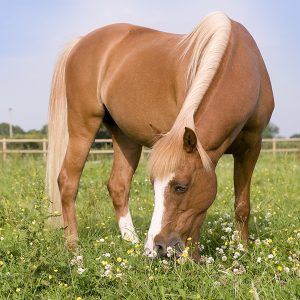
Can Clover Slobbers Hurt Your Horse?
Excessive salivation in a horse can be dramatic when it appears as a bubbly or foamy mouth with strings of drool leading to a puddle on the barn floor. When it’s caused by “clover slobbers,” it’s a nuisance that’s not usually life-threatening, but it is worth monitoring for the risk of dehydration, colic, and other potential issues.
Horse owners whose pastures contain clover, particularly red clover, often will have horses with clover slobbers during humid or wet conditions. That’s because, while clover can be a good source of nutrients and energy for some horses, in humid weather it’s susceptible to the fungus Slafractonia leguminicola, also known as Rhizoctonia leguminicola, or “black patch” for its appearance on infected plants. The fungus produces the mycotoxin slaframine, which stimulates salivation in horses that have consumed it.
Slaframine is most often found in red clover, but it also can infect white clover and alfalfa. It sometimes occurs in hay bales, especially of second-cutting hay that was harvested in wet or humid conditions or that contains affected clover.
Slobbering is the most common symptom of slaframine toxicosis in horses, but horses can show other symptoms, too, including
- Watery or teary eyes
- Diarrhea
- Frequent urination
Symptoms usually appear within several hours of the horse’s time on infected pasture or having eaten affected hay. Once the horse is removed from the source of the slaframine, symptoms usually resolve with 24-48 hours, but it’s important to be sure that the excessive drooling doesn’t leave him dehydrated—a risk that’s even higher in hot, humid conditions. Make sure your horse has a good supply of clean, cool water and electrolytes like Summer Games® Electrolyte, which replenishes crucial electrolytes that can become depleted through fluid loss, stress, and sweating.
If your horse shows signs of colic, bloating, or fever; has a higher than normal heart rate; has trouble swallowing; or appears to be in distress, call your vet immediately.
A veterinary examination can also help rule out other potentially more severe causes of slobbering, like botulism, a mouth injury, or choke.
SPONSOR: Summer Games® Electrolyte
Summer Games is a unique blend of electrolytes and trace minerals, specifically formulated to replenish critical electrolytes in the proper ratio. Summer Games supports healthy electrolyte balance to help your horse stay hydrated, perform at optimal levels, and recover faster after exercise of stressful situations.



